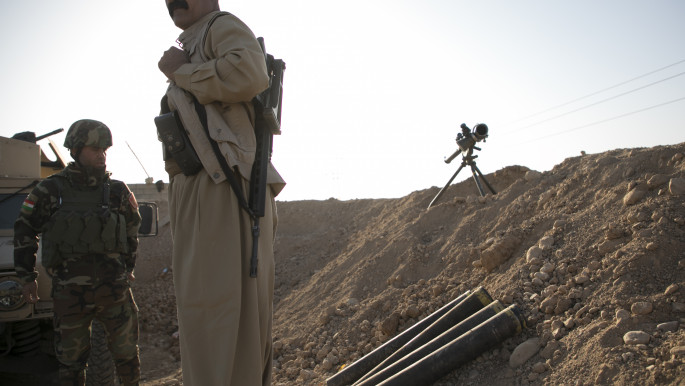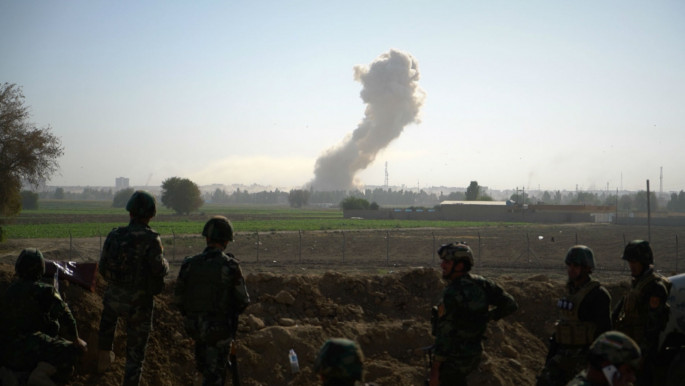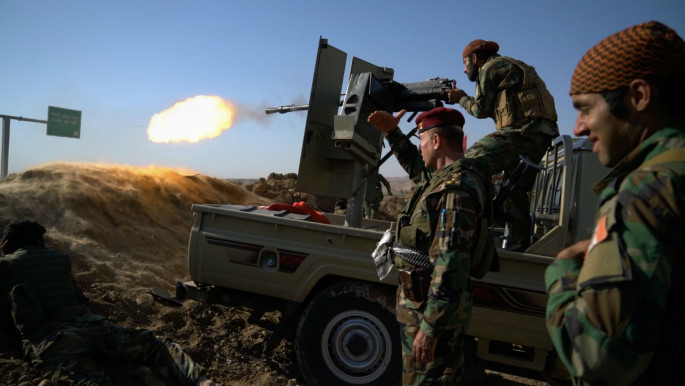Holding the line, Kurds take a stand for Erbil
"These are our last moments. We won't go back, never," says Warrant Officer Neihaad Sdeq Mohammad of the Kurdistan Freedom Party's [PAK] 5th Division. "We will stay and fight, till the end."
Just four days after Iraqi forces and the allied Hashd al-Shaabi [Popular Mobilisation Forces] militias took the city of Kirkuk, clashes broke out at the southern most Peshmerga line.
Fighting began at 9am GMT on the Erbil-Kirkuk road near the village of Pirde, when Iraqi Special Forces (ISOF) fired mortar rounds at Kurdish units.
Standing by an officer command post, the group of generals were taken off guard when a mortar landed a few metres from our position. The magnitude was comparable to a 81mm mortar, says Adam McCaw, a former Green Beret. Gunfire immediately erupted from both sides.
The fighting was fierce. Iraqi forces continued to pound the Kurdish frontline with heavy shelling, forcing the Peshmerga fighters to fall back 1km north. They made it to the Altun Kompri checkpoint, which denotes the current Iraq/Kurdistan border and lies 50km north of Kirkuk.
At the checkpoint - where Peshmerga numbers were larger - fighting continued. Kurdish forces have heavy artillery units and tanks on both the east and west flanks and barraged Iraqi units. Soldiers toting anti-tank Panzerfaust 3s dug in awaiting the Iraqi push.
 |
|
| As Iraqi government forces secured Kirkuk, Kurdish Peshmerga forces rushed to Iraqi Kurdistan's frontiers [Adam McCaw/AMYKmedia] |
A bridge divides the two outfits; it's the only way into Kurdish-held lands from the south. When Iraqi forces made a move to cross, Peshmerga blew up the bridge. Reports of two Iraqi Humvees being destroyed spread through the men. Shouts and celebratory gunfire sang through the northern Kurdish front.
The Peshmerga fell back to pre-2016 lines on Monday, after failed negotiations between the government of Iraq and the Kurdish Regional Government (KRG) led to conflict. Baghdad demanded that the KRG remove all forces from Kirkuk province and its surrounding oil fields.
"The Peshmerga left Kirkuk so the civilians would not suffer. Our leaders and politicians knew this," explains Colonel Sergat Mohammed Youssef. "We aren't scared of the Iraqi Army, we aren't afraid of their tanks, we invite them."
After Kirkuk was reclaimed by the Iraqi government, the General Command of the Peshmerga forces called the attack on Kirkuk "a clear declaration of war against the people of Kurdistan... the Peshmerga will bravely defend their people".
After the crushing loss of Kirkuk - which has been described as the heart of Kurdistan - the Peshmerga's reputation suffered a heavy blow and the Kurdish forces had something to prove. Unlike the battle for Kirkuk, the Peshmerga held fast and fought the encroaching Iraqi army with resolve.
"Our Families are [north] and in Erbil, we will fight to keep them safe," says the colonel.
 |
| A thick black tower of smoke rose from the Iraqi held south as planes could be heard flying overhead. Altun Kompri checkpoint, Kurdistan [Yomi Kleinmann/ AMYKmedia] |
There are roughly 40 different Iraqi state-sponsored militias working closely with Baghdad to liberate areas under Islamic State group control.
Most recently, the Hashd al-Shaabi has been used as a key force within the Iraqi ranks pushing back the Kurdistan borders. Due to these recent offensives, tensions have been escalating between the Peshmerga and the Hashd al-Shaabi.
Since the Hashd pushed the Kurds out of the prized city of Kirkuk, Peshmerga special forces killed Zeriva Abu Yasser, the Iranian Hashd al-Shaabi general.
The stakes were high and the intensity of the fighting proved it. Makeen Mustafa, a seasoned front-line fixer said he hadn't seen fighting like this since Mosul.
Last night at 2am, two trucks waving a Hashd al-Shabbi banner drove north to the Peshmerga frontline in an effort to scout their positions. "They came and we showed them our DShK (a Russian heavy machine gun) and we destroyed them," said General Hamma Reggar.
Kurds also had help from the border to the east. The Iranian PAK - known as the Kurdistan Freedom Falcons - supported their Iraqi counterparts. "We are all Kurdish. From one family of Kurdistan," said the PAK officer Sdeq Mohammed.
The Iranian PAK - like the Hashd - came to Iraq in 2014 to fight the IS threat but the two forces that once fought for the same cause, now turned their guns on each other.
As fighting continued late into the afternoon, a distinguished thud woke everyone from the white-knuckled fight.
A thick black tower of smoke rose from the Iraqi-held south and planes could be heard flying overhead. Suddenly, Peshmerga forces rejoiced and shouted with the small victory. It's still unclear if the attack was in fact an airstrike and if it was, where it had came from. What was clear was the renewed gusto in the Kurdish forces.
 |
| A Peshmerga soldier fires back at Iraqi forces as they make a push on the Altun Kompri checkpoint [Yomi Kleinmann/ AMYKmedia] |
The battle was becoming a costly stalemate. Rudaw reports that Iraqi Prime Minister Haider al-Abadi ordered his forces to hold its position and stop its progress at the "administrative boundaries of Kirkuk province with Erbil".
The call to cease the forward movement may have done just that but didn't stop the fighting. The battle was turning into a fight for national pride for both Iraq and Kurdistan.
Later that day, France called upon the Iraqi government to, "show restraint and fully respect the rights of the Kurds", said French foreign ministry spokesperson Agnes Romatet-Espangne in a statement reported by Reuters.
The day ended with both Peshmerga and Iraqi forces held the same ground as they did when the fighting began. This - to the Kurds - was a victory. The coming days will define the future of both this conflict and the Kurdish nation as a whole.
"We are ready, my men are prepared to die," said Peshmerga Colonel Sergat Mohammed Youssef.
"My men are in the face of death. We will not leave. This is it, this is our last line."
Adam McCaw and Joachim "Yomi" Kleinmann are a photography and print journalism team covering areas of conflict.
Adam spent several years in the US Army Special Forces and has a working knowledge of deep infrastructure in the Middle East. Yomi has a background as an EMT, giving the team unparalleled experience in hostile environments.


